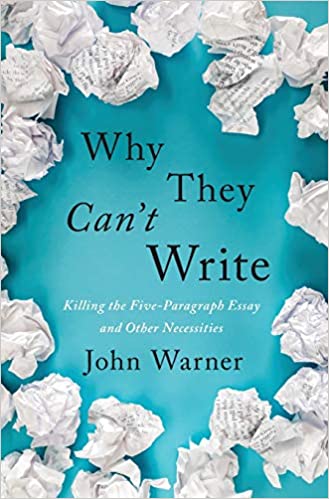Why They Can’t Write
John Warner’s Why They Can’t Write: Killing the Five-Paragraph Essay and Other Necessities is a passionate and provocative critique of how writing is taught in schools, and why so many students graduate without the ability to express themselves clearly or think critically on the page. Drawing on his experience as a college writing instructor, Warner doesn’t blame students for poor writing skills. Instead, he points the finger at a rigid, test-driven education system that prizes formulas over thought and compliance over creativity.
At the heart of the book is Warner’s call to abandon the ubiquitous five-paragraph essay, a format he argues does more harm than good. While this structure may help students survive timed tests, it rarely encourages original thinking or meaningful engagement with ideas. Warner believes that when writing becomes an exercise in filling in a template, it strips away the joy of discovery and reduces writing to a performance, rather than a process of communication and exploration.
What makes Warner’s argument especially compelling is that he doesn’t just complain; he proposes a new way forward. He advocates for a writing pedagogy that treats students as writers, not just students of writing. That means giving them room to explore ideas, write with authentic purpose, and engage with real audiences. He calls for writing assignments that are open-ended, personally meaningful, and intellectually challenging—precisely the kind of writing that builds critical thinking and lifelong skills.
For parents, Why They Can’t Write is an eye-opening look at why your child might dread writing assignments or struggle to express complex ideas. It’s not a failure of intelligence; it’s often the result of a system that has reduced writing to a mechanical exercise. Warner’s book invites parents and educators alike to reimagine writing education as a creative, messy, and deeply human activity—one that requires time, trust, and freedom.
Warner also tackles broader educational issues, such as standardised testing, the overemphasis on assessment, and the increasing corporatisation of education. He argues that these systemic pressures have created a culture of fear around failure, leaving students anxious and disengaged. By advocating for more humane and student-centred approaches, he makes a compelling case for restoring curiosity and creativity to the classroom.
For parents interested in how their children learn and why the current system often falls short, Warner’s book is an essential and thought-provoking read. It will leave you rethinking not only how writing should be taught, but what education should truly be about.
Last Updated on 17 June 2025
Our aim is to help our children discover their talents, realise their full potential, and develop a passion for life-long learning.






